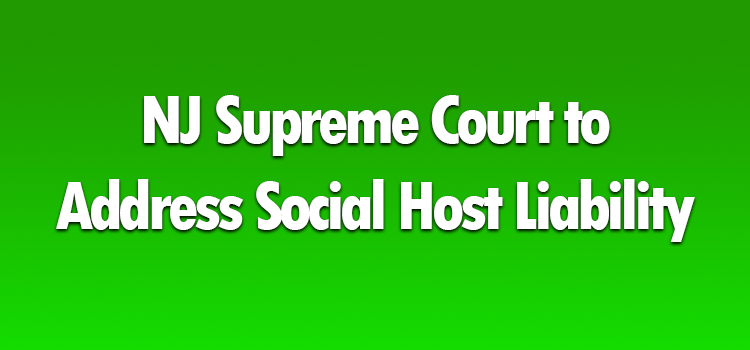The Supreme Court of New Jersey recently agreed to consider the extent of social host liability under New Jersey law. The case, Estate of Narleski v. Gomes, specifically involves whether there is a legal duty of the owners or occupants of a home to prevent underage individuals from consuming alcohol there.

Facts of Estate of Narleski v. Gomes
As the Appellate Division explained, the tragic facts of the case were set in motion when decedent Brandon Narleski purchased a “handle” of vodka, three twenty-four ounce cans of beer, and a two-liter bottle of soda from a liquor store owned and operated by defendant Amboy Food Liquor and News, Inc. (Amboy). Three young men – Xavier Pinto, Zachary Johnson, and Mark Zwierzynski – accompanied Narleski to the liquor store. The store clerk did not check Narleski’s identification to verify that he was of legal age. The men were all adults over the age of eighteen but were under the legal drinking age of twenty-one.
Once Narleski purchased the alcohol, the young men drove to Mark’s house, where he lived with his mother, Mercedes Apraez. While at the residence, the four friends “hung out” in Mark’s bedroom, drank the purchased alcohol, and played games. Mark’s mother was not home when they arrived. At some point during the gathering, Narleski sent a text message to Nicholas Gomes, who also was an adult under the age of twenty-one, to come to Mark’s house to join the group in drinking.
At some point, Gomes and Narleski left the house, intending to go to a friend’s house about fifteen minutes away. Gomes got into the driver’s seat and fastened his seatbelt. Narleski got into the passenger’s seat, but did not fasten his own seatbelt. While Gomes was driving on a highway, he lost control of the car and crashed into the center median. As a result of the crash, Narleski was ejected from the vehicle and pronounced dead on the scene.
The Estate of Brandon Narleski and his parents subsequently filed a wrongful death suit against Gomes and Anboy. Amboy filed a third-party complaint against Mark Zwierzynski and his parents, seeking contribution and indemnity. The third-party complaint alleged that Mark and his parents were negligent in failing to supervise Narleski and Gomes, enabling those underage adults to consume alcohol in their home.
The trial court concluded that the third-party defendants did not have a legal duty to supervise the underage persons who had been drinking alcohol in their home because those persons were adults. Thereafter, plaintiffs settled their claims with the direct defendants, i.e., Amboy and Gomes. However, Amboy appealed the dismissal of the third-party claims.
Appellate Division’s Decision in Estate of Narleski v. Gomes
The Appellate Division affirmed summary judgment. It agreed that Mark’s parents didn’t have a statutory or common law duty to prevent their adult son from allowing his underage friends to consume alcohol in his room without the parents’ knowledge or consent. However, it held that individuals like Mark could be held liable, although it declined to impose liability in this case.
“Prospectively, however, we hold that an adult such as Mark Zwierzynski who is under the legal drinking age shall owe a common law duty to injured parties to desist from facilitating the drinking of alcohol by underage adults in his place of residence, regardless of whether he owns, rents, or manages the premises,” Judge Jack Sabatino wrote. “Such a rule of law is a logical extension of Thomas and Morella, and is consistent with the policy objectives of related statutes,” he added.
“We need not resolve here whether a claim for contribution or indemnity by a Dram Shop defendant against an underage social host seeking to diminish its liability would be viable or instead contrary to public policy. We recognize that the common law rule of liability we have endorsed goes beyond the scope of the disorderly persons statute, N.J.S.A. 2C:33-17,” Sabatino further explained. “For these reasons, the trial court’s summary judgment dismissal of Amboy’s third-party complaint is affirmed.”
The Appellate Division deferred the effective date of its decision for 180 days “to enable possible further judicial review or responsive legislation.”
Issues Before the NJ Supreme Court
The New Jersey Supreme Court granted a petition for certification on October 10, 2019. It has agreed to consider the following question: “Does an adult who is under the legal drinking age owe injured parties a duty under the common law to desist from facilitating drinking by underage adults in his or her place of residence?” Oral arguments have not yet been scheduled.
